Analysis: A war of opinions brewing in Malaysia and Indonesia over impact of anti-Israel boycotts
Analysts say boycotts on alleged pro-Israel businesses are unlikely to directly impact the hostilities in Gaza, although they can be a moral support for the cause.
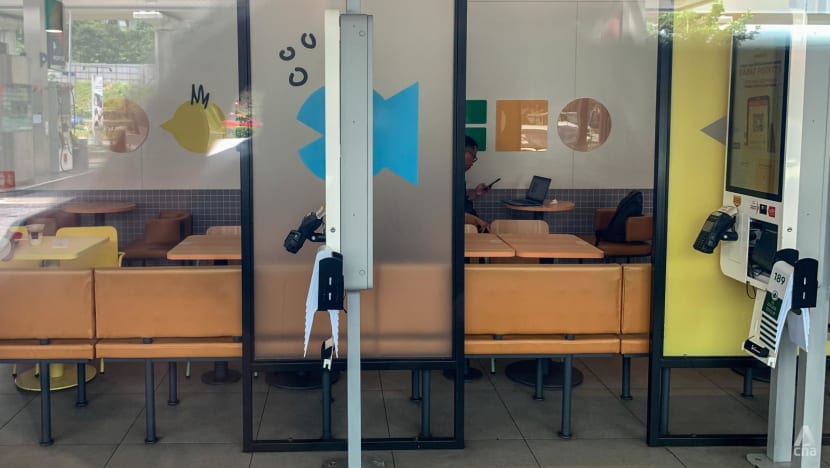
An almost empty McDonald's outlet is seen during lunch hour at a location in Shah Alam, Selangor. (Photo: CNA/Fadza Ishak)

This audio is generated by an AI tool.
KUALA LUMPUR/JAKARTA: The lunchtime crowd at the McDonald’s outlet in Section 3 of Shah Alam, Selangor usually has the fast food restaurant packed with diners, with empty parking lots a rarity. Multiple vehicles would also normally be lined up at the drive-through.
But these days, this and many other outlets of the popular fast-food chain in Malaysia have been experiencing a slowdown in business as a result of boycotts protesting the Israel-Hamas war.
The calls for boycotts against companies with alleged links to Israel have been strong on social media platforms such as X, TikTok, Instagram and Facebook.
Checks by CNA at several McDonald’s outlets in the Klang Valley area - including the one in Shah Alam - on a weekday showed that there were fewer customers than usual.
Other firms that are facing calls for boycotts include Starbucks, Kentucky Fried Chicken (KFC), Pizza Hut and Burger King.
Grab Malaysia, too, has been a target of the boycotts. This after screenshots of several Instagram stories posted by Ms Chloe Tong - the wife of the ride-hailing company’s chief executive officer Anthony Tan - circulated on social media platforms.
In the undated posts, Ms Tong had said that she had fallen “completely in love” with Israel because of her past visits there.
Over in Indonesia, while netizens have pushed for a boycott of products produced by alleged pro-Israel companies, the situation on the ground has not been reflective of this as scepticism hovers over the actual impact of such actions.
Business was still as usual at several Starbucks and McDonald’s outlets in Jakarta, as seen by CNA, with an expert noting that the Boycott, Divestment, Sanctions (BDS) movement has not gained much traction in the country.
BDS is a Palestinian-led movement which seeks to pressure Israel to comply with international laws by promoting boycotts, divestments and sanctions against the country.
Muslim-majority nations Malaysia and Indonesia have been vocal in condemning Israel for the atrocities in Gaza that have seen more than 10,000 people - over 4,000 of whom are children - killed in retaliation to Hamas’s cross border assaults on Oct 7.
Similar anti-Israel boycotts have been also seen in other parts around the world such as South Africa and Türkiye. Meanwhile, some South American countries including Bolivia and Chile have broken their diplomatic ties with Israel and recalled their ambassadors.
HOPES OF THE BDS MOVEMENT
Dr Nazari Ismail, the chairman of BDS Malaysia, told CNA that the movement aims to end international support for Israeli violations of international law by forcing companies, institutions and governments to change their policies.
Dr Nazari said that the campaign also aims to raise awareness about how Israel oppresses the Palestinian people.
He said that currently, many Malaysian consumers are “disgusted by the genocide” that is taking place in Gaza. Some firms are also perceived by consumers to be directly or indirectly related to the genocide.
Dr Nazari added that many consumers believe that it is the responsibility of the management team of firms affected to figure out actions that will address this challenge.
“As an example, a public condemnation of the genocide being committed by Israel towards the Palestinians may help to reduce their negative image. Sadly, some are reluctant to do even that. As a result, many Malaysian consumers continue to perceive them negatively.
“These firms should not complain if they suffer losses and cause their workers to lose their jobs,” he said, adding that international boycotts were instrumental in bringing down the apartheid regime in South Africa.
Meanwhile, BDS Indonesia told CNA that it wants companies to “clearly state that they oppose what is done by Israeli national companies which support the military action in Gaza”.
“Then their level of complicity will be considerably reduced and we can (remove them as a) main target of the boycott,” it said.
Explaining the BDS movement in Indonesia, the organisation said the companies it chooses to boycott are those who are most complicit in aiding Israel, and those which would affect locals the least if boycotted.
“An example is HP (Hewlett-Packard Company), which is clearly a supplier to the Israeli military … but has a small workforce in Indonesia,” it told CNA.
BOYCOTTS IN MALAYSIA STILL GOING STRONG
As a result of the hostilities and increasing death rate in Gaza, consumers in both Malaysia and Indonesia have been told that boycotts will help allegedly decrease funds for Israel’s war campaign.
A manager of a McDonald's outlet in Klang Valley told CNA on the condition of anonymity that the restaurants were seeing a huge reduction in business, especially among Malay consumers.
He said that while they have not laid off any workers, the firm has had to cut the working hours of their staff members.
Some outlets - which were previously operating 24 hours – are now only open from 7am to 2am, for example.
“The crew is made up of people of all races and religions. Some of them are disabled and need their jobs to survive. I can only hope this boycott ends soon,” said the restaurant manager, adding that he also felt for the Palestinian people.
Some staff members have also had to deal with abuse from members of the public.
“It’s very difficult for them as they face pressure to quit. But it’s not as if jobs can come about so quickly. These workers also have mouths to feed,” he said.
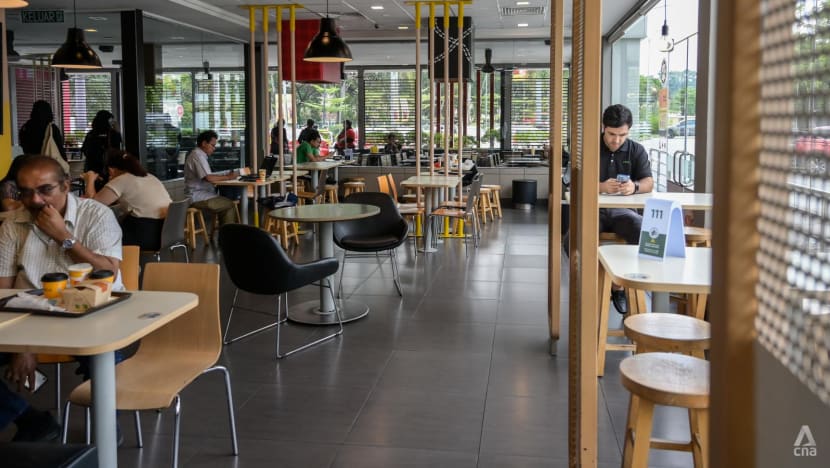
Most other staff members in McDonald's, when approached, did not want to speak about the issue, including one at an outlet who could be seen donning a Palestinian scarf on top of her tudung.
“You can see for yourself,” she said curtly when asked how business was doing.
While most Grab car and delivery riders told CNA that they have not been affected much by the supposed boycott against the company, one told CNA that there were fewer orders in the past few days.
The delivery rider, who wanted to be known only as Aref, said that the orders for McDonald’s and Starbucks have seen a decrease, while the orders from other restaurants have remained constant.
“I understand if people want to boycott but I hope they think it through because these things can affect the income of riders,” he said.
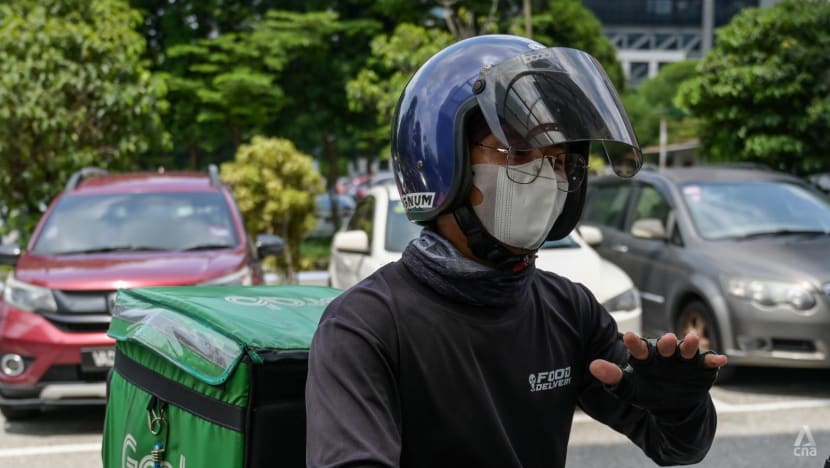
For their part, McDonald’s and Grab Malaysia have issued statements pledging RM1 million (US$213,000) each for relief efforts in the Palestinian territories.
Gerbang Alaf Restaurants, which owns McDonald’s Malaysia, said in a statement on Oct 15 that they were a local firm that is 100 per cent Muslim-owned.
It also said that the actions of a McDonald's outlet in Israel to provide food to the Israeli army was not a global decision and approved by other local operators.
Grab meanwhile said on Nov 6 when announcing its RM1 million donation to Malaysian non-governmental organisation Mercy Malaysia’s Palestinian Fund that it was deeply “saddened by the plight of the communities affected by the conflict in Gaza and condemned any act of violence that threatens humanity”.
CNA has also reached out to Nestle, Pizza Hut, and KFC for comments.
INDONESIANS HOPEFUL OF BOYCOTT BUT BUSINESSES SEE LITTLE CHANGE
In Indonesia, while some consumers have declared a boycott on alleged pro-Israel firms, the number of visitors to such businesses in Jakarta has not seen a noticeable drop.
Those participating in the boycott told CNA that until the war stops, they will no longer purchase items produced by alleged pro-Israel companies.
Ms Adi Tasya Nurzahra, 27, said that she did not want to contribute financially to Israel’s acquisition of “weapons of war”.
“I believe that by 'reducing' Israel's income from around the world, it (can shrink) Israel's budget for its defence equipment,” said the social media specialist.
She also said she hopes that the boycott will force franchise owners to push for a peace process after seeing their financial statements in the red.
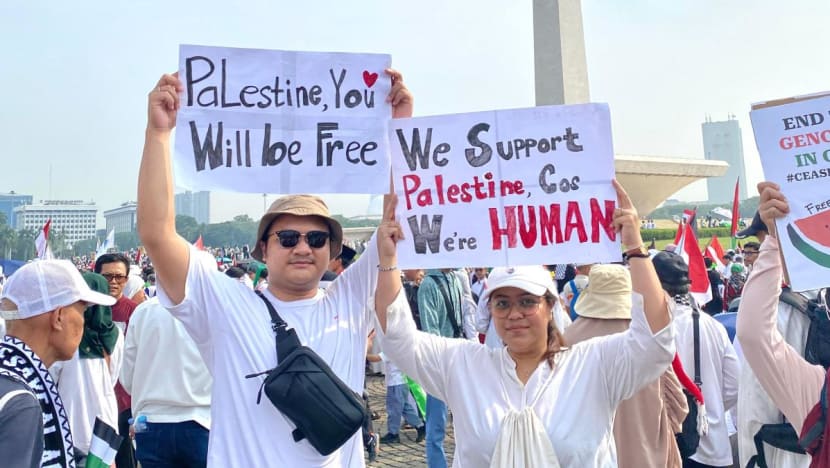
Another Indonesian, Ms Izmiria Az Zahra, 27, told CNA that she believes the boycott will affect the sustainability of companies, citing how the stock of some alleged pro-Israel companies has gone down since the conflict.
After McDonald’s Israel announced on Oct 12 that it would provide free meals to Israeli soldiers, the parent company saw a fall in its shares at the end of the trading session that day, with a 1.89 per cent fall from the previous day.
Commenting on concerns that the boycott may affect the livelihoods of local workers, Ms Izmiria said that “priorities must be considered”.
“There are people who are really going to be killed (under the) genocide in front of our eyes.
“It's not that I don't sympathise with employees of companies that are boycotted. But the fact is that these employees still have a choice of work, still live in an independent country, and can still find clean water, electricity, and food,” she said.
However, Mr Made Supriatma - a visiting fellow at the ISEAS-Yusof Ishak Institute in Singapore - told CNA that the success of the BDS movement has been limited in Indonesia, with domestic political issues taking precedence.
“While people may have sympathy for the Palestinian issue, their attention and engagement seem more focused on pressing domestic matters that directly affect their daily lives,” said Mr Made.
Among such matters is the upcoming general election, he said, which is set to be held on Feb 14 next year.
Mr Made said that even for the boycott against McDonald’s, many consumers appear unaware of it, with outlets continuing to operate normally with no noticeable decline in customers.
“This demonstrates that the success of a boycott can vary significantly based on factors such as consumer awareness, local ownership, and brand perception,” he told CNA.
He also doubted that the boycott would be a long-lasting movement or have long-term consequences, particularly as those boycotting are likely to be those who are peer pressured as well as those who do not regularly purchase from such companies.
“Some boycotters are motivated by peer pressure … When this peer pressure diminishes, perhaps due to the passage of time or changing social dynamics, these individuals are likely to resume consuming the products they once boycotted,” he said.
“And those boycotting McDonald's, for example, are often not regular McDonald's customers. They (already) hold pre-existing beliefs or religious views that shape their perceptions of these products, (such as) a conservative Muslim who may already have clear opinions that McDonald's food is (not) halal.”
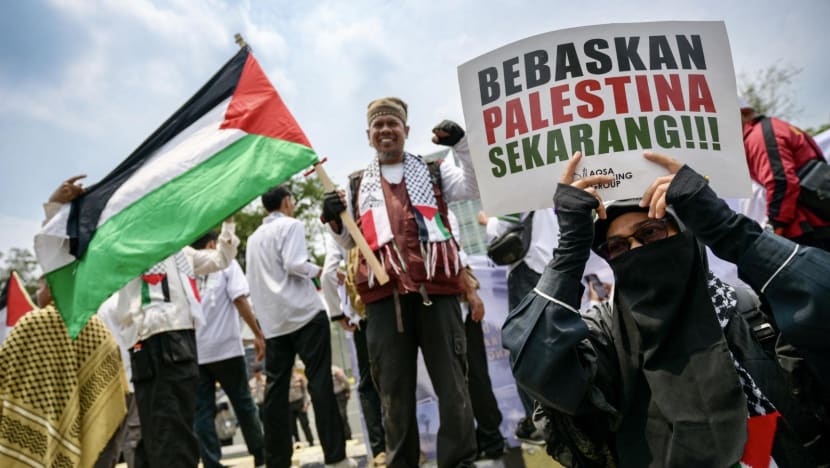
Two McDonald's workers in Indonesia who were approached by CNA declined to be interviewed, saying that they were not authorised to speak on the situation.
When contacted by CNA, McDonald's Indonesia associate director of communications Ms Meta Rostiawati said: "The current (boycott) certainly poses challenges. But for us, ensuring the safety and comfort of our customers and employees is always our top priority."
On Wednesday, PT Rekso Nasional Food - the franchisee of McDonald's Indonesia - said that it will donate 1.5 billion rupiah (US$95,800) of humanitarian aid through the National Alms Agency of Indonesia.
It had also earlier clarified in a statement on Oct 10 that it is not affiliated with franchises in other countries.
“We would like to emphasise that PT Rekso Nasional Food is a national private company, wholly owned by Indonesian entrepreneurs with more than 16,000 local employees,” according to the statement.
“McDonald's Indonesia is an entity that operates independently and is not affiliated with the operations or decisions of McDonald's in other countries, including McDonald's Israel.”
SUPPORT FOR BUSINESSES AFFECTED BY BOYCOTTS
However, not all Malaysians who support the Palestinian cause are for the boycott of franchises like McDonald's.
On TikTok, Malaysian influencer Abdullah Jamadi said in several videos that the boycotts would only hurt the workers in these establishments, most of whom are Malay and Muslim.
Mr Abdullah - who has more than 600,000 followers on his TikTok account - said that the suppliers of chicken, bread and vegetables as well as transportation for these goods were Malaysians.
“In this issue of boycotts, the most affected are the Malay workers,” he said in a video on TikTok.
He added that while he supports the local brands, they don’t have the capacity to provide jobs just as McDonald's has done.
In one video, Mr Abdullah shared that McDonald's in Malaysia was 100 per cent owned by Muslims and had an economical impact on the community.
“If you want to keep on boycotting go ahead, but remember that those affected the most are our people,” he said in the video posted on Nov 1.
Mr Abdullah’s posts on the boycotts have received its fair share of praise and criticism.
One user named Muhammad Faiz commented that while the workers were affected, they were not being bombed while sleeping.
“There are a lot of jobs out there,” he said.
Another user jonney80, however, said that Mr Abdullah was mature in his thinking.
LOCAL ECONOMY FIRST TO FEEL IMPACT OF BOYCOTTS, SAY EXPERT
Economist Dr Yeah Kim Leng of Sunway University in Malaysia said that the boycott could potentially increase unemployment, especially if there was a huge slowdown in business.
He said that employees could first be placed on staggered working hours resulting in an income loss to them.
“When there is less income, consumption will be slower. The worst-case scenario would be retrenchments and will lead to social problems,” he said, adding that it was important not to allow the boycott to spread to other businesses.
He added that there could be ramifications to an entire supply chain in a particular industry, with the franchise businesses of McDonalds, for example, and businesses in the supply chain owned by Malaysians.
“The immediate impact is to the local economy,” he said.
He said that as McDonald’s is an extensive food chain in the country, the impact of the boycott will be felt widely.
According to its website, McDonald’s Malaysia has more than 320 outlets in the country and serves more than 13.5 million customers a month.
It also employs more than 15,000 workers in Malaysia.
Dr Yeah doubted the boycott would have a direct impact on the Israel-Hamas war in Gaza, although it would be seen as moral support for the Palestinian cause.
“A more productive way of expressing support is sending more humanitarian aid rather than affecting our local economy and local businesses,” he said.
Mr Dedi Dinarto, lead Indonesia analyst at public policy advisory firm Global Counsel, told CNA that banning multinational companies affiliated with Israel could also potentially harm the Indonesian economy.
This is because these companies have employed local workers and utilise local resources, he added.
He said that the Indonesian government is also unlikely to ban Israeli products or companies with ties to Israel.
“There is not a compelling economic rationale that suggests such a ban would significantly impact Israel's economy and deter them from their actions against the Palestinians,” said Mr Dedi.
The push for a boycott also does not align with the government’s official position, he said, citing how several government officials in the cabinet and parliament have said that the boycott is not an effective means of deterring Israel.
“Instead, they believe Indonesia should continue advocating for Palestinian rights in the United Nations (UN), especially since Indonesia (has a seat) in the United Nations Human Rights Council,” he told CNA.
Last Friday, Ms Meutya Hafid - who is the chairman of the Indonesian House of Representatives’ First Commission - publicly condemned the boycott and said that a solution needs to be reached through international forums such as the UN.



























